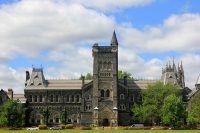Are you considering pursuing a Master’s degree in Engineering? Canada is home to some of the world’s top-ranked universities offering cutting-edge programs in engineering. With a booming tech industry and diverse research opportunities, Canada has become a popular destination for international students seeking a high-quality education in engineering. In this article, we will explore the top 5 universities in Canada for a Master’s in Engineering, popular programs, career prospects, and financial aid options available to students. So, whether you’re a Canadian resident or an international student, read on to discover your options for pursuing a Master’s in Engineering in Canada.
-
PictureUniversity NameLocationUniversity Details
-
 Toronto, OntarioPublic College, Estd 1827
Toronto, OntarioPublic College, Estd 1827
QS Rank – 26
Online and On-Campus -
 Montreal, QuebecPublic College, Estd 1821
Montreal, QuebecPublic College, Estd 1821
QS Rank – 27
Online and On-Campus -
 Vancouver, British ColumbiaPublic College, Estd 1908
Vancouver, British ColumbiaPublic College, Estd 1908
QS Rank – 46
Online and On-Campus -
 Edmonton, AlbertaPublic College, Estd 1908
Edmonton, AlbertaPublic College, Estd 1908
QS Rank – 110
Online and On-Campus -
 Waterloo, OntarioPublic College, Estd 1957
Waterloo, OntarioPublic College, Estd 1957
QS Rank – 152
Online and On-Campus
Top 5 Universities For Masters In Engineering In Canada
The following table provides an overview of the top 5 universities in Canada for pursuing a Master’s degree in Engineering. It includes information such as the university name, program name, duration, tuition fees, and average salaries of graduates. This can help aspiring students make informed decisions while selecting the university and program that aligns with their academic and career goals.
| University Name | Program Name | Duration | Tuition Fee (Per Year) | Average Salaries (CAD/year) |
|---|---|---|---|---|
| University of Toronto (UofT) | Master of Applied Science in Engineering | 1-3 years | CAD 16,420 – CAD 60,180*, CAD 22,970 – CAD 61,350** | CAD 68,000 |
| McGill University | Master of Engineering | 1-2 years | CAD 17,850*, CAD 9,109 – CAD 18,005** | CAD 68,000 |
| University of British Columbia (UBC) | Master of Applied Science in Engineering | 1-2 years | CAD 10,320 – 22,808*, CAD 32,880 – CAD 39,986** | CAD 70,000 |
| University of Alberta | Master of Engineering | 1-2 years | CAD 9,316 – CAD 11,609*, CAD 19,385 – CAD 21,684** | CAD 75,000 |
| University of Waterloo | Master of Engineering | 1-2 years | CAD 6,520 – CAD 8,740*, CAD 16,680 – CAD 23,510** | CAD 75,000 |
As you can see, these universities offer a range of programs in engineering with varying duration and tuition fees. The average salaries of graduates are also provided to give an idea of the potential career prospects after completing a master’s in engineering.
Popular Programs In Masters In Engineering In Canada
Masters of Engineering (MEng) is a professional graduate degree that provides advanced technical knowledge and skills in engineering. It is designed for individuals who want to advance their careers in engineering and specialize in a particular area of engineering.
Canada has some of the best universities that offer masters in Canada. Here are some popular programs of masters of engineering in Canada:
- Civil Engineering: Civil engineering is a broad field that deals with the design, construction, and maintenance of infrastructure, such as buildings, roads, bridges, and water supply systems. It includes various specializations, such as structural engineering, transportation engineering, geotechnical engineering, and environmental engineering.
- Mechanical Engineering: Mechanical engineering is a field that deals with the design, manufacturing, and maintenance of mechanical systems. It includes various specializations, such as aerospace engineering, automotive engineering, robotics, and mechatronics.
- Electrical and Computer Engineering: Electrical and computer engineering is a field that deals with the design, development, and implementation of electrical and computer systems. It includes various specializations, such as telecommunications, signal processing, power systems, and computer networks.
- Chemical Engineering: Chemical engineering is a field that deals with the design, development, and operation of chemical processes and systems. It includes various specializations, such as bioengineering, materials engineering, and environmental engineering.
- Software Engineering: Software engineering is a field that deals with the design, development, and maintenance of software systems. It includes various specializations, such as artificial intelligence, machine learning, and computer graphics. There’s great demand of MIS in Canada (Masters in Information Systems) as well. Among many software courses, there’s also a great demand currently for data science in Canada.
These are some of the popular programs of masters of engineering in Canada. Each of these programs provides advanced technical knowledge and skills that are essential for a successful career in engineering.
Curriculum for Master’s in Engineering Programs in Canada
Master’s in Engineering programs in Canada offer students an in-depth understanding of a specific field of engineering. The program typically lasts between 1.5 to 2 years and consists of a combination of coursework and research projects. Below is an overview of the curriculum for Master’s in Engineering programs in Canada.
Core Courses
Core courses are mandatory courses that provide students with foundational knowledge in their area of study. These courses may include:
- Engineering Mathematics
- Advanced Engineering Thermodynamics
- Fundamentals of Materials Science
- Advanced Topics in Mechanical Engineering
- Software Engineering
Elective Courses
Elective courses allow students to specialize in a particular field of engineering. The available elective courses depend on the program and the university. Some popular electives include:
- Renewable Energy Systems
- Robotics and Control
- Artificial Intelligence and Machine Learning
- Biomedical Engineering
- Sustainable Infrastructure
Research Projects
In addition to coursework, students are typically required to complete a research project or thesis. The research project is an opportunity for students to apply the skills and knowledge they have gained throughout their coursework to a real-world problem.
Internship
Many Master’s in Engineering programs in Canada offer students the option to complete an internship. The internship provides students with hands-on experience in their field of study and allows them to apply their knowledge to real-world projects.
Financial Aid And Scholarships
Financial aid and scholarships for Masters in Engineering programs in the top 5 universities in Canada can greatly help students manage the high cost of tuition fees and living expenses. Here is a breakdown of the financial aid and scholarships offered by these universities:
| University Name | Scholarship List |
|---|---|
| University of Toronto | 1. Ontario Graduate Scholarship 2. Connaught International Scholarship 3. Dean’s Excellence Entrance Scholarship 4. Canada Graduate Scholarship |
| McGill University | 1. McGill Engineering International Tuition Award 2. MasterCard Foundation Scholars Program 3. Barbara Bianco Fellowship |
| University of British Columbia | 1. Graduate Global Leadership Fellowships 2. Four Year Doctoral Fellowship 3. International Tuition Award |
| University of Alberta | 1. Faculty of Engineering International Scholarships 2. Graduate Excellence Awards 3. China Scholarship Council |
| University of Waterloo | 1. Ontario Graduate Scholarship 2. President’s Graduate Scholarship 3. David Johnston International Experience Award |
You may also check How To Apply For Scholarships In Canada here.
Pursuing a Master’s degree in Engineering from one of the top universities in Canada can provide you with the knowledge, skills, and experience necessary to succeed in a highly competitive job market. With the opportunities for research and access to cutting-edge facilities and technologies, these universities can provide an enriching experience that can help students achieve their career goals.
The GRE or the Graduate Record Examination is a common test for admissions to Engineering courses in Canadian Universities, however, it is not a compulsion for every university and can be waived. The GRE may help you get a fee waiver and other facilities in GRE accepting universities.
The general application fees for admissions to Master’s in Engineering program in Canada is around CAD 75 to CAD 150, however, this may vary depending on the choice of the University.
The average salary of an Engineer with a Master’s degree in Canada is around $63K- $102K annually. Variations can be noted depending on the field of Engineering you choose.
